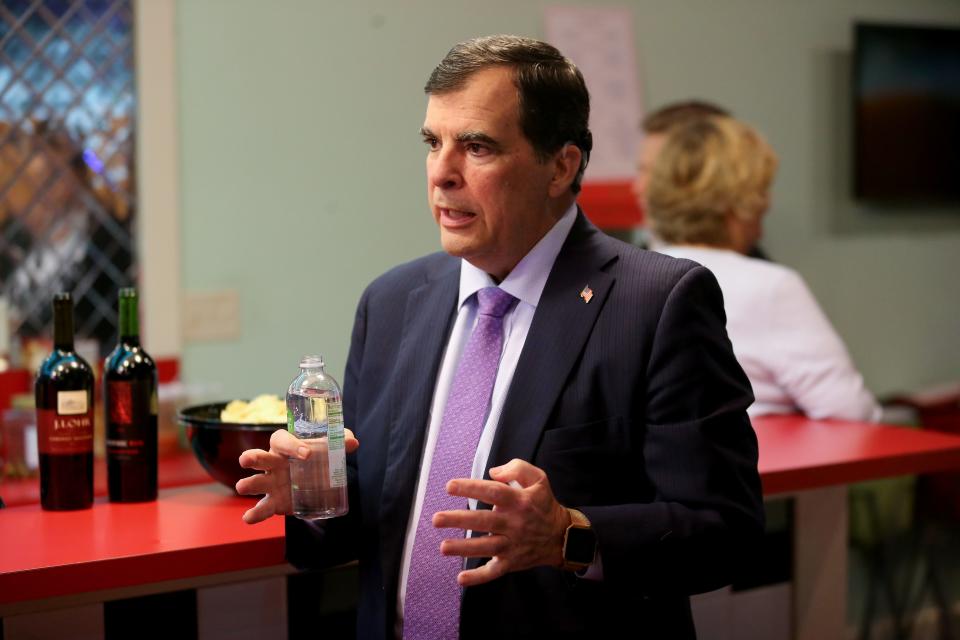Ohio Gov. Mike DeWine wants to ban flavored tobacco, fellow Republicans oppose menthol ban

- Oops!Something went wrong.Please try again later.
For a moment this spring, it seemed like Ohio Republicans were close to finally striking a deal on regulating flavored tobacco products.
The GOP-controlled Legislature would ban the sale of flavored nicotine and Gov. Mike DeWine would ban local governments from writing their own tobacco regulations. It was a tenuous compromise between free-market conservatives who viewed outlawing flavors as “nanny state” politics and those who saw regulations as critical to combating a youth vaping epidemic.
But the deal drafted into the Senate’s May budget fell apart in June because Republicans disagreed on whether to ban one specific flavor: menthol.
"The package they offered basically locked in menthol," DeWine said in a recent interview. "If I would have signed that, local communities would not have been able to ban menthol. It wasn’t a good tradeoff."
So, the status quo stood while parents, educators and health professionals wondered what more, if anything, Ohio could do to stop the vaping crisis.
Enquirer special report: Vaping crisis takes toll on children's health, families, schools
Free markets vs. public health
For the governor, banning the sale of all flavored tobacco products is an easy decision.
Study after study shows young people overwhelmingly prefer e-cigarettes that taste like fruit or candy. And it's those flavors that convince many to try vaping in the first place.
"Our nation's youth continue to be enticed and hooked by an expanding variety of e-cigarette brands delivering flavored nicotine," Centers for Disease Control and Prevention Director Deirdre Lawrence Kittner said in 2022 after a report showed 85% of teenage vapers used flavored products.
"It’s the flavors that really get them started," DeWine said.
That's why DeWine keeps pushing for a statewide ban on all flavors. He's convinced it would motivate most teenage users to quit and prevent thousands from starting in the first place.
"The giving up of people’s rights is so small that it certainly is worth the lives we are going to save," DeWine said.

But business-first Republicans like Sen. George Lang, a West Chester Republican, disagree.
“I believe in free markets and free people,” Lang said. “Government shouldn’t interfere. We shouldn’t arbitrarily pick winners and losers.”
Simply put, people have the right to smoke themselves to death if they choose to.
"I think everyone who partakes knows about the health concerns, and they have the freedom in life to make those choices," he said. "What's next? Do we ban sugary drinks and ban McDonald's?"
The debate over how to regulate vaping isn't the first time DeWine has sparred with members of his own party over public health. The governor found himself repeatedly at odds with Lang and other members of the Republican-controlled Legislature during the COVID-19 pandemic.
DeWine issued statewide mask mandates while conservatives gave themselves the power to override him.
"This is another example of the ultimate irony of iron-clad Republican control," University of Cincinnati political science professor David Niven said. "They are not all on the same page, and realistically they are not all on the same team."
Niven, who worked for former Democratic Gov. Ted Strickland, sees an ideological consistency in DeWine's positions though. The governor believes in banning products he views as harmful to public health, be they tobacco, recreational marijuana or even abortion.
"We believe in the freedom to vape, but we don’t believe in marijuana legalization or reproductive rights," Niven said of DeWine's fellow Republicans. "It's hard to draw the line of coherence through that."
Why menthol matters
Lawmaking is often an iterative process, meaning big changes are accomplished through multiple bills over time rather than all at once.
It's a truth DeWine knows after a career in politics that spans four decades, but he still turned down the Legislature's offer to ban the sale of every flavor except menthol.
When asked how he reached that decision, DeWine told The Enquirer that it came down to how menthol cools your throat and makes it easier for novice users to inhale.
"Menthol is an analgesic," said Dr. Alayna Tackett, director of Ohio State University's Center for Tobacco Research. "It can provide those cooling sensations to inhale more deeply and can kind of mask that harshness that you get from combustible tobacco."
That's why flavors like blueberry ice are so popular with underage users, she said.
Tackett and her team of researchers recently surveyed individuals between the ages of 14 and 21 regarding their e-cigarette use and found that 39% would quit if flavored e-liquids were banned. However, nearly 71% would stop if stores only sold tobacco-flavored products, according to the study published in the May 2023 Journal of Studies on Addiction and Drugs.
What are vapes? What's in them? Everything you need to know about e-cigarettes
Following the money
Tobacco and e-cigarette companies employ dozens of lobbyists in Ohio and regularly give to political campaigns. There are currently 35 lobbyists registered to tobacco and e-cigarette manufacturers, retailers and associations.
Altria has seven registered lobbyists in Ohio, according to an online database created by the Joint Legislative Ethics Committee. For context, Verizon Wireless has four registered lobbyists, and American Electric Power has 14.
Campaign finance records for Altria Group, the parent company for tobacco sellers such as e-cigarette company NJOY, didn't show any direct contributions to Lang. But the company made modest donations to many of his Senate colleagues as well as to the Republican Senate Campaign Committee and Ohio Senate Democrats.
In total, Altria has donated about $128,000 to Ohio politicians since 2020.
Reynolds American PAC donated $500 to Lang in 2021 and 2022, according to online records from the Secretary of State's Office. And it contributed $750 to Rep. Jon Cross, R-Kenton, who tried to push through a statewide ban on local tobacco regulations in December.
But DeWine, a longtime and outspoken critic of smoking and vaping, has received more donations than Lang and Kenton. The RJ Reynolds tobacco company donated thousands to the governor's 2022 reelection campaign and transition fund.
When it comes to vaping companies, JUUL donated $15,000 to Senate Republicans since 2020 and $10,000 to House.
Local regulation reigns

DeWine has twice vetoed attempts by the Legislature to block cities from regulating tobacco sales locally.
“This measure is not in the public interest,” DeWine told reporters in January.
Vaping crisis: Gov. Mike DeWine vetoes flavored tobacco ban bill, signals support for statewide ban
Supporters of the preemption argued patchwork regulations are ineffective and the state had an interest in writing rules that impact the private sector and commerce. Lang noted he also pushed for preemption on communities trying to tax plastic bags.
That became law in 2020, but the governor's consistent vetoes of tobacco preemption laws have allowed cities to consider these restrictions.
Columbus will ban the sale of all flavored tobacco products starting in January 2024. Cincinnati, Dayton and Cleveland are considering similar regulations.
"I have encouraged other cities to do it," DeWine said. "Other cities can do this and get it passed, and they should."
From the editor: Why The Enquirer spent 6 months investigating teen vaping
Enforcement as compromise?
State lawmakers returned to Columbus in mid-September, and Rep. Sara Carruthers, a Hamilton Republican, thinks she has a way to decrease underage vaping without a statewide ban.
House Bill 258 would increase the penalties for shops caught selling to underage users:
Up to $250 for a first offense.
Up to $500 for a second offense.
$500 for a third offense.
$1,000 for a fourth offense.
$1,500 for a fifth offense.
"I've upped the penalties because they obviously aren't enough," Carruthers said. "The schools here, they're finding cartridges everywhere ... It's absolutely an epidemic."

Fines alone might not be enough to change the behavior of retailers that earn hundreds of thousands off the sales of e-cigarettes. That's why Carruthers wants to label repeat offenders as public nuisances.
It's a legal designation that brands a location as "a menace to the public health, welfare, or safety," according to Ohio Revised Code. And it can be used to build a case for the closure of a business.
Sales to underage users aren't the only way teens buy vapes. Research from George Washington University showed that while 40% of underage users reported buying from retail sources in 2022, a majority relied on their social networks.
That's one reason why DeWine raised Ohio's age limit for tobacco products to 21 during his first term. He wanted to cut down on high school students asking an older friend to buy for them.
Now, he sees banning all flavored products as the next logical step.
But Carruthers isn't sure she can support a statewide flavor ban. And she doesn't think it has enough Republican votes to become law.
Her bill, however, could move "pretty quickly." She said that she had support from House Speaker Jason Stephens, a Kitts Hill Republican, and positive feedback from a vaping lobbyist who told her a handful of bad actors are threatening their own industry.
"They want it cracked down on," Carruthers said. "It's giving them a bad name."
Carruthers' bill also has support, in concept, from DeWine. Spokesman Dan Tierney said the governor supports stronger penalties and is reviewing the legislation.
Still, DeWine hopes to sign a statewide flavor ban before he leaves office.
"This is the easiest thing to do; it is the most effective thing we can do," DeWine said. "It will save lives, and it’s worth doing."
Read all the stories in this special report here.
This project was underwritten, in part, by Interact for Health. Underwriters do not determine, change or restrict content.

This article originally appeared on The Columbus Dispatch: Ohio Republicans divided on flavored tobacco bans

